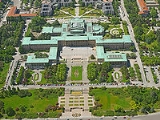
Grand National Assembly of Turkey
Encyclopedia
The Grand National Assembly of Turkey (TBMM), usually referred to simply as the Meclis ("parliament"), is the unicameral Turkish
legislature
. It is the sole body given the legislative prerogatives by the Turkish Constitution
. It was founded in Ankara
on 23 April 1920 in the midst of the Turkish War of Independence
. The parliament was fundamental in the efforts of Mustafa Kemal Atatürk
and his colleagues to found a new state out of the remnants of the Ottoman Empire
in the aftermath of the World War I
.
There are 550 members of parliament who are elected for a four-year term by the D'Hondt method
, a party-list proportional representation
system, from 85 electoral districts which represent the 81 administrative provinces of Turkey
(Istanbul is divided into three electoral districts whereas Ankara and İzmir are divided into two each because of their large populations). To avoid a hung parliament
and its excessive political fragmentation, only parties that win at least 10% of the votes
cast in a national parliamentary election gain the right to representation in the parliament. As a result of this threshold, only two parties were able to obtain that right during the 2002 elections and three in 2007. This rather high threshold has been internationally criticised, but a complaint with the European Court for Human Rights was turned down.
Independent candidates may also run and can be elected without needing a threshold.
Since the 2002 general elections
, an absolute majority of the seats belong to the members of the Justice and Development Party (AK Party)
, who lead a single-party government. In 2002, the Republican People's Party (CHP)
was the only other party that succeeded in being represented in Parliament. At the 2007 general elections
, three parties managed to clear the 10% threshold — AK Party, CHP, and the Nationalist Movement Party
(MHP). Furthermore, Kurdish
politicians from the Democratic Society Party
(DTP) circumvented the threshold by contesting the election as independents; 24 of them were elected, enabling them to constitute their own faction in the Assembly.
-opening_of_the_first_parlement.png) Turkey had two Parliamentary governments during the Ottoman
Turkey had two Parliamentary governments during the Ottoman
period. The First Constitutional Era
lasted for only a brief period, elections being held only twice. After the first elections there were a number of criticisms of the government due to the Russo-Turkish War, 1877–1878
by the representatives, and the assembly was dissolved and an election called on 28 June 1877. The second assembly was also dissolved by the Sultan on 14 February 1878.
The Second Constitutional Era
is considered to have begun on 23 July 1908. The constitution that was written for the first parliament included control of the sultan on the public and was removed during 1909, 1912, 1914 and 1916, in a session known as the "declaration of freedom". Most of the modern parliamentary rights that were not granted in the first constitution were granted, such as the abolition of the right of the Sultan to deport citizens that were claimed to have committed harmful activities, the establishment of a free press, a ban on censorship. Freedom to hold meetings and establish political parties was recognized, and the government was held responsible to the assembly, not to the sultan.
, the victorious Allied Powers
sought the dismemberment of the Ottoman state
through the Treaty of Sèvres
. The political existence of the Turkish nation was to be completely eliminated under these plans, except for a small region. Nationalist Turkish sentiment rose in the Anatolian peninsula, engendering the establishment of the Turkish national movement. The political developments during this period have made a lasting impact which continues to affect the character of the Turkish nation. During the Turkish war of independence
, Mustafa Kemal
put forth the notion that there would be only one way for the liberation of the Turkish people in the aftermath of World War I
, namely, through the creation of an independent, sovereign Turkish state. The Sultanate was abolished by the newly founded parliament in 1922, paving the way for the formal proclamation of the republic that was to come on 29 October 1923.
published his famous 19 March 1920 announcement. In this speech "an Assembly would be gathered in Ankara that would possess extraordinary powers, how the members who would participate in the assembly would be elected and the need to undertake elections at the latest within fifteen days". He also added that the members of the dispersed Chamber of Deputies could also participate in the assembly in Ankara, to increase the representational power of the parliament. The Turkish Grand National Assembly, established on national sovereignty, held its first opening session 23 April 1920.
.jpg) After the foundation of the Liberal Republican Party
After the foundation of the Liberal Republican Party
by Ali Fethi Okyar
, religious groups joined the liberals and consequently, widespread bloody disorders took place, especially in the eastern territories. The liberal party was dissolved on 17 November 1930 and no further attempt at a multiparty democracy was made until 1945. Turkey was admitted to the League of Nations
in July 1932.
started by the establishment of National Development Party
(Milli Kalkinma Partisi), founded by Nuri Demirağ
, in 1945. Later on, the Democrat party
was established the next year, and was elected in 1950.
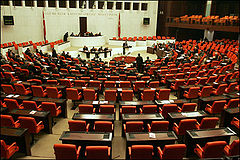 Under the constitution of 1961, the Grand National Assembly was a bicameral parliament with over 600 members, the upper house
Under the constitution of 1961, the Grand National Assembly was a bicameral parliament with over 600 members, the upper house
being the Senate
. The parliament again became unicameral under the current constitution which was ratified in 1982.
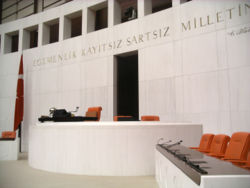 Current Speaker
Current Speaker
of the parliament is Cemil Çiçek
from the AK Party
, who was elected on 4 July 2011 in third round. He is the 25th Speaker of the parliament of Turkey succeeding his party colleague Mehmet Ali Şahin
.
An MP can attend more than one committee if s/he is not a member of Application Committee or Planning and Budgeting Committee. Members of those committees can not participate in any other committees. On the other hand s/he does not have to work for a committee either.
Number of members of each committee is determined by the proposal of the Advisory Council and the approval of the General Assembly.
Sub committees are established according to the issue that the committee receives. Only Public Enterprises (PEs) Committee has constant sub committees that are specifically responsible for a group of PEs.
Committee meetings are open to the MPs, the Ministers’ Board members and the Government representatives. The MPs and the Ministers’ Board members can talk in the committees but can not make amendments proposals or vote. Every MP can read the reports of the committees.
NGOs can attend the committee meetings upon the invitation of the committee therefore volunteer individual or public participation is not available. Media, but not the visual media, can attend the meetings. The media representatives are usually the parliamentary staff of the media institutions. The committees can prevent the attendance of the media with a joint decision.
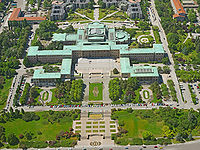 The building which first housed the Parliament was converted from the Ankara headquarters of the Committee of Union and Progress
The building which first housed the Parliament was converted from the Ankara headquarters of the Committee of Union and Progress
, the political party that overthrew Sultan Abdulhamid II in 1909 in an effort to bring democracy to the Ottoman Empire. It is now used as the locale of the Museum of the War of Independence. The second building which housed the Parliament has also been converted to a Museum, the Museum of the Republic. The Grand National Assembly is now housed in a modern and imposing building in the Bakanlıklar neighborhood of Ankara.
The building was depicted on the reverse
of the Turkish 50,000 lira
banknotes of 1989-1999.
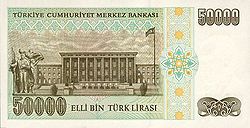
Turkey
Turkey , known officially as the Republic of Turkey , is a Eurasian country located in Western Asia and in East Thrace in Southeastern Europe...
legislature
Legislature
A legislature is a kind of deliberative assembly with the power to pass, amend, and repeal laws. The law created by a legislature is called legislation or statutory law. In addition to enacting laws, legislatures usually have exclusive authority to raise or lower taxes and adopt the budget and...
. It is the sole body given the legislative prerogatives by the Turkish Constitution
Constitution of Turkey
This article relates to a current event. See also the Turkish constitutional referendum, 2010The Constitution of the Republic of Turkey is Turkey's fundamental law. It establishes the organization of the government and sets out the principles and rules of the state's conduct along with its...
. It was founded in Ankara
Ankara
Ankara is the capital of Turkey and the country's second largest city after Istanbul. The city has a mean elevation of , and as of 2010 the metropolitan area in the entire Ankara Province had a population of 4.4 million....
on 23 April 1920 in the midst of the Turkish War of Independence
Turkish War of Independence
The Turkish War of Independence was a war of independence waged by Turkish nationalists against the Allies, after the country was partitioned by the Allies following the Ottoman Empire's defeat in World War I...
. The parliament was fundamental in the efforts of Mustafa Kemal Atatürk
Mustafa Kemal Atatürk
Mustafa Kemal Atatürk was an Ottoman and Turkish army officer, revolutionary statesman, writer, and the first President of Turkey. He is credited with being the founder of the Republic of Turkey....
and his colleagues to found a new state out of the remnants of the Ottoman Empire
Ottoman Empire
The Ottoman EmpireIt was usually referred to as the "Ottoman Empire", the "Turkish Empire", the "Ottoman Caliphate" or more commonly "Turkey" by its contemporaries...
in the aftermath of the World War I
World War I
World War I , which was predominantly called the World War or the Great War from its occurrence until 1939, and the First World War or World War I thereafter, was a major war centred in Europe that began on 28 July 1914 and lasted until 11 November 1918...
.
There are 550 members of parliament who are elected for a four-year term by the D'Hondt method
D'Hondt method
The d'Hondt method is a highest averages method for allocating seats in party-list proportional representation. The method described is named after Belgian mathematician Victor D'Hondt who described it in 1878...
, a party-list proportional representation
Party-list proportional representation
Party-list proportional representation systems are a family of voting systems emphasizing proportional representation in elections in which multiple candidates are elected...
system, from 85 electoral districts which represent the 81 administrative provinces of Turkey
Provinces of Turkey
Turkey is divided into 81 provinces, called il in Turkish .A province is administered by an appointed governor , and was formerly termed a "governorate" ....
(Istanbul is divided into three electoral districts whereas Ankara and İzmir are divided into two each because of their large populations). To avoid a hung parliament
Hung parliament
In a two-party parliamentary system of government, a hung parliament occurs when neither major political party has an absolute majority of seats in the parliament . It is also less commonly known as a balanced parliament or a legislature under no overall control...
and its excessive political fragmentation, only parties that win at least 10% of the votes
Election threshold
In party-list proportional representation systems, an election threshold is a clause that stipulates that a party must receive a minimum percentage of votes, either nationally or within a particular district, to obtain any seats in the parliament...
cast in a national parliamentary election gain the right to representation in the parliament. As a result of this threshold, only two parties were able to obtain that right during the 2002 elections and three in 2007. This rather high threshold has been internationally criticised, but a complaint with the European Court for Human Rights was turned down.
Independent candidates may also run and can be elected without needing a threshold.
Since the 2002 general elections
Turkish general election, 2002
Turkey's 15th general election was held on November 3, 2002 following the collapse of the DSP-MHP-ANAP coalition led by Bülent Ecevit. It was won by the Justice and Development Party , led by Recep Tayyip Erdoğan, producing a crushing majority in spite of their winning just 34.3% of the national vote...
, an absolute majority of the seats belong to the members of the Justice and Development Party (AK Party)
Justice and Development Party (Turkey)
The Justice and Development Party , abbreviated JDP in English and AK PARTİ or AKP in Turkish, is a centre-right political party in Turkey. The party is the largest in Turkey, with 327 members of parliament...
, who lead a single-party government. In 2002, the Republican People's Party (CHP)
Republican People's Party (Turkey)
The Republican People's Party is a centre-left Kemalist political party in Turkey. It is the oldest political party of Turkey and is currently Main Opposition in the Grand National Assembly. The Republican People's Party describes itself as "a modern social-democratic party, which is faithful to...
was the only other party that succeeded in being represented in Parliament. At the 2007 general elections
Turkish general election, 2007
Turkey's 16th general election was held on July 22, 2007 and resulted in a resounding victory for the incumbent Justice and Development Party...
, three parties managed to clear the 10% threshold — AK Party, CHP, and the Nationalist Movement Party
Nationalist Movement Party
The Nationalist Movement Party , is a far-right political party in Turkey.In the 2002 general elections, the party had lost its 129 seats as it had won only 8.34% of the national vote...
(MHP). Furthermore, Kurdish
Kurds in Turkey
Ethnic Kurds compose a significant portion of the population in Turkey . Unlike the Turks, the Kurds speak an Indo-European language...
politicians from the Democratic Society Party
Democratic Society Party
The Democratic Society Party was a Kurdish Kurdish nationalist political party in Turkey. The party considered itself social democratic, and had observer status in the Socialist International. It was considered to be the successor of the Democratic People's Party...
(DTP) circumvented the threshold by contesting the election as independents; 24 of them were elected, enabling them to constitute their own faction in the Assembly.
History
Turkey has had a history of Parliamentary government before the establishment of the current national Parliament:Ottoman Empire
-opening_of_the_first_parlement.png)
Ottoman Empire
The Ottoman EmpireIt was usually referred to as the "Ottoman Empire", the "Turkish Empire", the "Ottoman Caliphate" or more commonly "Turkey" by its contemporaries...
period. The First Constitutional Era
First Constitutional Era (Ottoman Empire)
The First Constitutional Era of the Ottoman Empire was the period of constitutional monarchy from the promulgation of the Kanûn-ı Esâsî , written by members of the Young Ottomans, on 23 November 1876 until 13 February 1878...
lasted for only a brief period, elections being held only twice. After the first elections there were a number of criticisms of the government due to the Russo-Turkish War, 1877–1878
Russo-Turkish War, 1877–1878
The Russo-Turkish War of 1877–1878 was a conflict between the Ottoman Empire and the Eastern Orthodox coalition led by the Russian Empire and composed of numerous Balkan...
by the representatives, and the assembly was dissolved and an election called on 28 June 1877. The second assembly was also dissolved by the Sultan on 14 February 1878.
The Second Constitutional Era
Second Constitutional Era (Ottoman Empire)
The Second Constitutional Era of the Ottoman Empire began shortly after Sultan Abdülhamid II restored the constitutional monarchy after the 1908 Young Turk Revolution. The period established many political groups...
is considered to have begun on 23 July 1908. The constitution that was written for the first parliament included control of the sultan on the public and was removed during 1909, 1912, 1914 and 1916, in a session known as the "declaration of freedom". Most of the modern parliamentary rights that were not granted in the first constitution were granted, such as the abolition of the right of the Sultan to deport citizens that were claimed to have committed harmful activities, the establishment of a free press, a ban on censorship. Freedom to hold meetings and establish political parties was recognized, and the government was held responsible to the assembly, not to the sultan.
Establishment of the National Parliament
After World War IWorld War I
World War I , which was predominantly called the World War or the Great War from its occurrence until 1939, and the First World War or World War I thereafter, was a major war centred in Europe that began on 28 July 1914 and lasted until 11 November 1918...
, the victorious Allied Powers
Allies of World War I
The Entente Powers were the countries at war with the Central Powers during World War I. The members of the Triple Entente were the United Kingdom, France, and the Russian Empire; Italy entered the war on their side in 1915...
sought the dismemberment of the Ottoman state
Partitioning of the Ottoman Empire
The Partitioning of the Ottoman Empire was a political event that occurred after World War I. The huge conglomeration of territories and peoples formerly ruled by the Sultan of the Ottoman Empire was divided into several new nations.The partitioning was planned from the early days of the war,...
through the Treaty of Sèvres
Treaty of Sèvres
The Treaty of Sèvres was the peace treaty between the Ottoman Empire and Allies at the end of World War I. The Treaty of Versailles was signed with Germany before this treaty to annul the German concessions including the economic rights and enterprises. Also, France, Great Britain and Italy...
. The political existence of the Turkish nation was to be completely eliminated under these plans, except for a small region. Nationalist Turkish sentiment rose in the Anatolian peninsula, engendering the establishment of the Turkish national movement. The political developments during this period have made a lasting impact which continues to affect the character of the Turkish nation. During the Turkish war of independence
Turkish War of Independence
The Turkish War of Independence was a war of independence waged by Turkish nationalists against the Allies, after the country was partitioned by the Allies following the Ottoman Empire's defeat in World War I...
, Mustafa Kemal
Mustafa Kemal Atatürk
Mustafa Kemal Atatürk was an Ottoman and Turkish army officer, revolutionary statesman, writer, and the first President of Turkey. He is credited with being the founder of the Republic of Turkey....
put forth the notion that there would be only one way for the liberation of the Turkish people in the aftermath of World War I
World War I
World War I , which was predominantly called the World War or the Great War from its occurrence until 1939, and the First World War or World War I thereafter, was a major war centred in Europe that began on 28 July 1914 and lasted until 11 November 1918...
, namely, through the creation of an independent, sovereign Turkish state. The Sultanate was abolished by the newly founded parliament in 1922, paving the way for the formal proclamation of the republic that was to come on 29 October 1923.
Passage to national constitution
Mustafa KemalMustafa Kemal Atatürk
Mustafa Kemal Atatürk was an Ottoman and Turkish army officer, revolutionary statesman, writer, and the first President of Turkey. He is credited with being the founder of the Republic of Turkey....
published his famous 19 March 1920 announcement. In this speech "an Assembly would be gathered in Ankara that would possess extraordinary powers, how the members who would participate in the assembly would be elected and the need to undertake elections at the latest within fifteen days". He also added that the members of the dispersed Chamber of Deputies could also participate in the assembly in Ankara, to increase the representational power of the parliament. The Turkish Grand National Assembly, established on national sovereignty, held its first opening session 23 April 1920.
1923–1945
.jpg)
Liberal Republican Party (Turkey)
The Liberal Republican Party was a political party founded by Ali Fethi Okyar in the early years of the Turkish Republic....
by Ali Fethi Okyar
Ali Fethi Okyar
Ali Fethi Okyar was a Turkish diplomat and politician who also served as a military officer and as a diplomat during the last decade of the Ottoman Empire...
, religious groups joined the liberals and consequently, widespread bloody disorders took place, especially in the eastern territories. The liberal party was dissolved on 17 November 1930 and no further attempt at a multiparty democracy was made until 1945. Turkey was admitted to the League of Nations
League of Nations
The League of Nations was an intergovernmental organization founded as a result of the Paris Peace Conference that ended the First World War. It was the first permanent international organization whose principal mission was to maintain world peace...
in July 1932.
1945-present
The Multi-Party period in TurkeyHistory of the Republic of Turkey
The Republic of Turkey was created after the overthrow of Sultan Mehmet VI Vahdettin by the new Republican Parliament in 1922. This new regime delivered the coup de grâce to the Ottoman state which had been practically wiped away from the world stage following the First World War.-Single-party...
started by the establishment of National Development Party
National Development Party
National Development Party can refer to:* National Development Party * National Development Party * National Development Party * National Development Party * National Development Party...
(Milli Kalkinma Partisi), founded by Nuri Demirağ
Nuri Demirag
Nuri Demirağ was an early Turkish industrialist. He was one of the first millionaires of the Turkish Republic. His first innovation was the production of cigarette paper. Demirağ then invested his capital in the development of the Turkish railway network...
, in 1945. Later on, the Democrat party
Democratic Party (Turkey)
Democratic Party may refer to:* Democratic Party , current party* Democratic Party a historical party * Democratic Party a historical party...
was established the next year, and was elected in 1950.
1945–1980

Upper house
An upper house, often called a senate, is one of two chambers of a bicameral legislature, the other chamber being the lower house; a legislature composed of only one house is described as unicameral.- Possible specific characteristics :...
being the Senate
Senate of the Republic
Senate of the Republic was the name of the upper house of Turkish Parliament between 1961-1980- History :Although the Turkish Parliament was established in 1920 to replace the older Ottoman Parliament, the parliament was composed of only the lower house. Turkish Constitution of 1961 introduced the...
. The parliament again became unicameral under the current constitution which was ratified in 1982.
Speaker of the parliament

Speaker (politics)
The term speaker is a title often given to the presiding officer of a deliberative assembly, especially a legislative body. The speaker's official role is to moderate debate, make rulings on procedure, announce the results of votes, and the like. The speaker decides who may speak and has the...
of the parliament is Cemil Çiçek
Cemil Çiçek
Cemil Çiçek is a Turkish politician who is the current Speaker of the Parliament of Turkey since July 4, 2011. He served as the Deputy Prime Minister of Turkey and Justice and Development Party Member of Parliament from Ankara. He was formerly Minister of Justice and government spokesman.-Early...
from the AK Party
Justice and Development Party (Turkey)
The Justice and Development Party , abbreviated JDP in English and AK PARTİ or AKP in Turkish, is a centre-right political party in Turkey. The party is the largest in Turkey, with 327 members of parliament...
, who was elected on 4 July 2011 in third round. He is the 25th Speaker of the parliament of Turkey succeeding his party colleague Mehmet Ali Şahin
Mehmet Ali Sahin
Mehmet Ali Şahin is a Turkish politician. He was the Speaker of the Parliament of Turkey between 2009 and 2011....
.
Specialized committees
- Constitution committee (26 members)
- Justice committee (24 members)
- National Defense committee (24 members)
- Internal affairs committee (24 members)
- Foreign affairs committee (24 members)
- National Education, Culture, Youth and Sports committee (24 members)
- Development, reconstruction, transportation and tourism committee (24 members)
- Environment committee (24 members)
- Health, family, employment, social works committee (24 members)
- Agriculture, forestry, rural works committee (24 members)
- Industry, Commerce, Energy, Natural Resources, Information and Technology Committee (24 members)
- Committee for checking GNAT Accounts (15 members)
- Application committee (13 members)
- Planning and Budget committee (39 members)
- Public enterprises committee (35 members)
- Committee on inspection of Human rights (23 members)
- European Union Harmonization Committee (21 members) (not available in Parliamentary Procedures)
Parliamentary Research Committees
These committees are one of auditing tools of the Parliament. The research can begin upon the demand of the Government, political party groups or min 20 MPs. The duty is assigned to a committee whose number of members, duration of work and location of work is determined by the proposal of the Parliamentary Speaker and the approval of the General Assembly.Parliamentary Investigation committees
These committees are established if any investigation demand re the PM and ministers occur and approved by the General Assembly through hidden voting.International Committees
- Parliamentary Assembly of the Organisation of Security Co-operation in Europe (8 members)
- Parliamentary Assembly of NATO (12 members)
- The Council of Europe Parliamentary Assembly (14 members)
- Western European Union Parliamentary Assembly for Security and Defense (12 members)
- Turkey – European Union Joint Parliamentary Committee (14 members)
- Parliamentary Union of the Organization of Islamic Conference (5 members)
- Parliamentary Assembly of the Organization of the Black Sea Economic Cooperation (9 members)
- Union of Asian Parliaments for Peace (3 members)
- Parliamentary Assembly of Europe and Mediterranean (6 members)
- Inter-parliamentary Union
An MP can attend more than one committee if s/he is not a member of Application Committee or Planning and Budgeting Committee. Members of those committees can not participate in any other committees. On the other hand s/he does not have to work for a committee either.
Number of members of each committee is determined by the proposal of the Advisory Council and the approval of the General Assembly.
Sub committees are established according to the issue that the committee receives. Only Public Enterprises (PEs) Committee has constant sub committees that are specifically responsible for a group of PEs.
Committee meetings are open to the MPs, the Ministers’ Board members and the Government representatives. The MPs and the Ministers’ Board members can talk in the committees but can not make amendments proposals or vote. Every MP can read the reports of the committees.
NGOs can attend the committee meetings upon the invitation of the committee therefore volunteer individual or public participation is not available. Media, but not the visual media, can attend the meetings. The media representatives are usually the parliamentary staff of the media institutions. The committees can prevent the attendance of the media with a joint decision.
Current composition
The breakdown of seats in the previous legislature was as follows:Parliament building

Committee of Union and Progress
The Committee of Union and Progress began as a secret society established as the "Committee of Ottoman Union" in 1889 by the medical students İbrahim Temo, Abdullah Cevdet, İshak Sükuti and Ali Hüseyinzade...
, the political party that overthrew Sultan Abdulhamid II in 1909 in an effort to bring democracy to the Ottoman Empire. It is now used as the locale of the Museum of the War of Independence. The second building which housed the Parliament has also been converted to a Museum, the Museum of the Republic. The Grand National Assembly is now housed in a modern and imposing building in the Bakanlıklar neighborhood of Ankara.
The building was depicted on the reverse
Obverse and reverse
Obverse and its opposite, reverse, refer to the two flat faces of coins and some other two-sided objects, including paper money, flags , seals, medals, drawings, old master prints and other works of art, and printed fabrics. In this usage, obverse means the front face of the object and reverse...
of the Turkish 50,000 lira
Turkish lira
The Turkish lira is the currency of Turkey and the de facto independent state of the Turkish Republic of Northern Cyprus. The lira is subdivided into 100 kuruş...
banknotes of 1989-1999.


